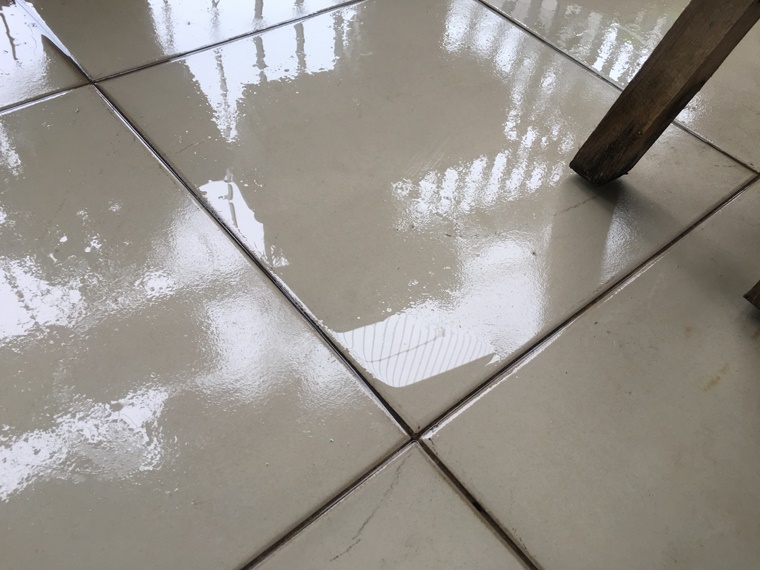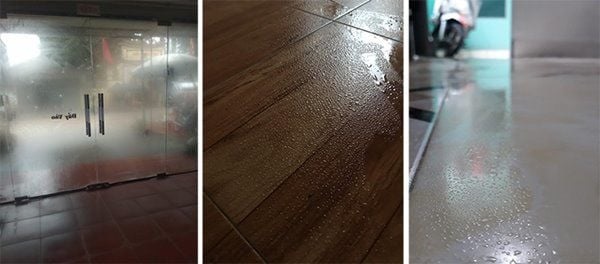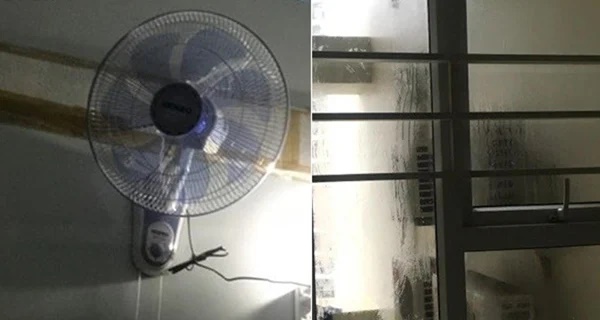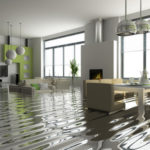Sweat Home – considered a specialty of the North, these days floors, glass doors… are often extremely sweaty and dirty.
Not only that, if not promptly addressed, the walls can be moldy or peeling paint, and furniture can easily be damaged. To remedy this situation, many people continuously turn on fans or open doors to ventilate, hoping that the wind will quickly dry the house, but this method only makes the humid condition worse.

The reason is that the cold air blown by the fan causes the humid air to condense more, and more water accumulates, so the house takes longer to dry. On the other hand, if you open the doors, the wind will bring humid air into the house, and the humid air lingers in the house, making it even more damp. Instead, you should follow the methods below to remedy the humid house:

Close all doors and close bathroom doors
As mentioned above, opening doors only worsens the humid condition of the house, so the first golden principle to effectively prevent moisture is to close all doors.
In addition, you need to close the bathroom door, as this area is considered the most humid in the house. Close the bathroom door after use so that the steam does not escape, making the floor wet. Besides, you should turn on the fan in the bathroom to push the steam out.
Turn on the air conditioner in dry mode
If you have an air conditioner installed in your house, you should turn on the air conditioner in dry mode to help dehumidify the air. This method is considered the most effective way to remedy the humid condition. Moreover, when turning on the air conditioner, the air in the house will circulate, ensuring the health of the family members.
Clean the house with a dry cloth
In humid days, you should limit mopping the floor with water, otherwise the floor will not only be clean but also slippery and even more humid. It’s best to use a dry and clean cloth to wipe the water on the floor. If you really need to clean, squeeze the cloth well and then wipe, then use a dry and clean cloth to wipe again immediately.

Use moisture-absorbing materials
There are many boxes/grains of moisture-absorbing available on the market, you can buy and place them in the corners of the house to absorb moisture in the air. If you have dry charcoals or lime (about 10-15kg), you can also place them in a pot in a corner of the room or under the bed to absorb moisture. Note that, only place them in the house, do not burn the charcoal.
Some other notes when the house is humid
– To avoid the bad smell caused by humidity, you can place essential oils in the corners of the house or burn orange or grapefruit peels to make the house smell pleasant.
– Avoid placing electronic devices such as TV, phones, computers,… directly on the floor or against the wall to prevent moisture from entering the devices and causing damage or electric shock. It’s best to place the devices higher off the ground about 1m, about 10-15cm away from the wall.
– Limit washing clothes on humid days, avoid drying clothes with fans because the clothes will take longer to dry and may smell unpleasant.
– Bamboo, wooden utensils such as chopsticks, ladles, bowls,… should be rinsed with hot water after washing and then dried before storing to prevent mold.
According to Xe và thể thao (Cars and Sports)
Tips for Avoiding Mold Growth in Your Home
 Home‘>
Home‘>Dangerous types of mold are infiltrating our homes and workspaces, posing a health threat to the occupants.
How to Grill Chicken for Optimal Juiciness and Tenderness
Grilling up chicken that is tender, juicy, and bursting with flavor is easy – and we’re going to show you how! With just a few tips and tricks, you can make mouthwatering grilled chicken every single time. Learn which ingredients to use, which spices to marinate with, and the best cooking techniques to put to use. Get ready to wow your family and friends with delicious grilled chicken!




































